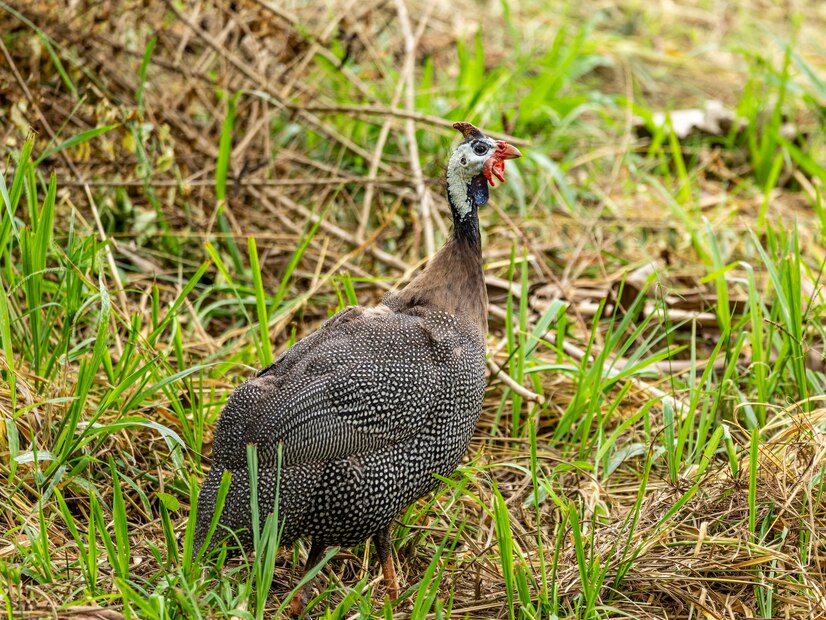Introduction to Guinea Fowl
guinea fowl, with their distinctive spots and rich history, are more than just beautiful birds. Originating from Africa, these birds have made a significant mark worldwide. Their roots trace back to ancient civilizations where they were valued for their meat and eggs. Over time, guinea fowl have found their place in diverse ecological and agricultural roles.
These birds are not just ornamental; they play a crucial role in pest control and sustainable farming. Their natural diet includes ticks, insects, and weed seeds, making them invaluable in organic farming. In this guide, we’ll explore the fascinating world of guinea fowl, offering insights and practical tips for anyone interested in raising these remarkable birds.
Guinea Fowl Breeds
Overview of the Most Common Guinea Fowl Breeds
There are several breeds of guinea fowl, each with unique characteristics. The most common breeds include the Pearl, White, and Lavender guinea fowl. Each breed has its own set of traits, from feather patterns to temperament.
Differences in Appearance, Behavior, and Egg Production
The Pearl guinea fowl is the most recognized breed, with its grey feathers and white spots. White guineafowl, as their name suggests, are pure white and often preferred for their aesthetic appeal. Lavender guineafowl have a lighter, bluish-grey plumage. Behaviorally, guineafowl are known for their sociable nature, but they can be skittish if not handled frequently. When it comes to egg production, they lay smaller eggs compared to chickens but are highly nutritious.
Raising Guinea Fowl
Suitable Environments and Housing for Guinea Fowl
Creating the right environment is crucial for raising guineafowl. Unlike chickens, guineafowl prefer open spaces where they can roam freely. However, they still need a secure coop to protect them from predators at night. A well-ventilated coop with ample space per bird is ideal.
Feeding and Nutritional Requirements
Guineafowl thrive on a diet similar to chickens, but with a higher protein requirement. They enjoy a mix of grains, greens, and insects. Supplementing their diet with high-protein feed ensures they stay healthy. Providing fresh water is equally important, as dehydration can affect their overall health.
Breeding and Hatching Guinea Fowl Eggs
Breeding guineafowl requires patience and the right conditions. These birds typically breed in the warmer months. After mating, the hens will lay eggs in secluded nests. Incubating the eggs requires consistent temperature and humidity levels. Once hatched, keets (baby guineafowl) need a warm, dry environment and a diet rich in protein.
Health and Care


Guinea fowl are generally hardy, but they can face health issues like respiratory infections and parasites. Ensuring a clean living environment and regular health checks can prevent these problems. Early detection and treatment are key to maintaining a healthy flock.
Basic Care and Handling Tips for a Healthy Flock
Handling guineafowl requires a gentle approach. They can be flighty, so regular interaction helps them become accustomed to human presence. Trimming their wings can prevent them from flying away. Regularly cleaning their coop and providing fresh bedding reduces the risk of infections.
The Importance of Routine Vaccinations
Vaccinations are crucial for preventing diseases in guineafowl. Consult with a veterinarian to establish a vaccination schedule. Common vaccines include those for Newcastle disease and fowl pox. Keeping up with vaccinations ensures your flock remains healthy and productive.
Interaction with Other Animals
How Guinea Fowl Interact with Other Poultry and Livestock
Guineafowl can coexist with other poultry and livestock, but their interactions depend on proper introductions and space. They often get along well with chickens and ducks, but their noisiness can sometimes disturb other animals. Providing enough space minimizes conflicts and ensures a harmonious environment.
Their Role in Pest Control in Gardens and Farms
One of the greatest benefits of raising guineafowl is their natural pest control abilities. They forage for insects, ticks, and weed seeds, reducing the need for chemical pesticides. This makes them excellent partners in organic farming and gardening. Their presence can significantly reduce pest populations, contributing to a healthier ecosystem.
Guinea Fowl in the Community
Guineafowl hold cultural importance in many regions. In Africa, they are often featured in folklore and traditional ceremonies. Their meat and eggs are highly prized in various cuisines. Understanding their cultural significance adds depth to their value beyond just farming.
Their Role in Sustainable and Organic Farming Practices
In sustainable and organic farming, guineafowl are invaluable. Their pest control abilities reduce reliance on chemicals, promoting a healthier environment. Their manure also serves as a natural fertilizer, enriching the soil. Integrating guineafowl into farming practices supports sustainability goals.
Conclusion
Guineafowl are unique, versatile birds that offer numerous benefits to those who raise them. From their pest control abilities to their cultural significance, they are more than just pretty birds. By understanding their needs and behaviors, you can successfully integrate them into your farm or garden.